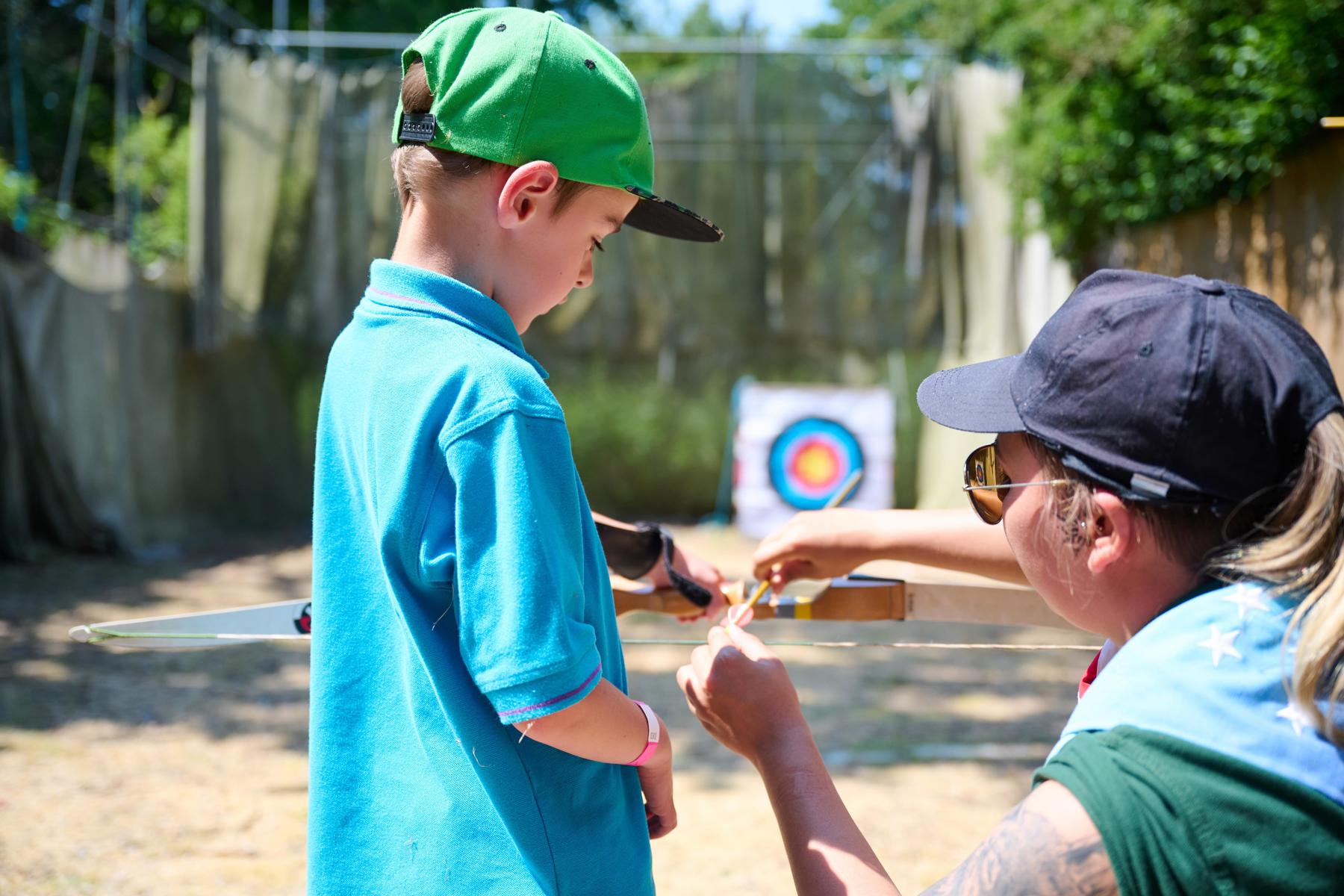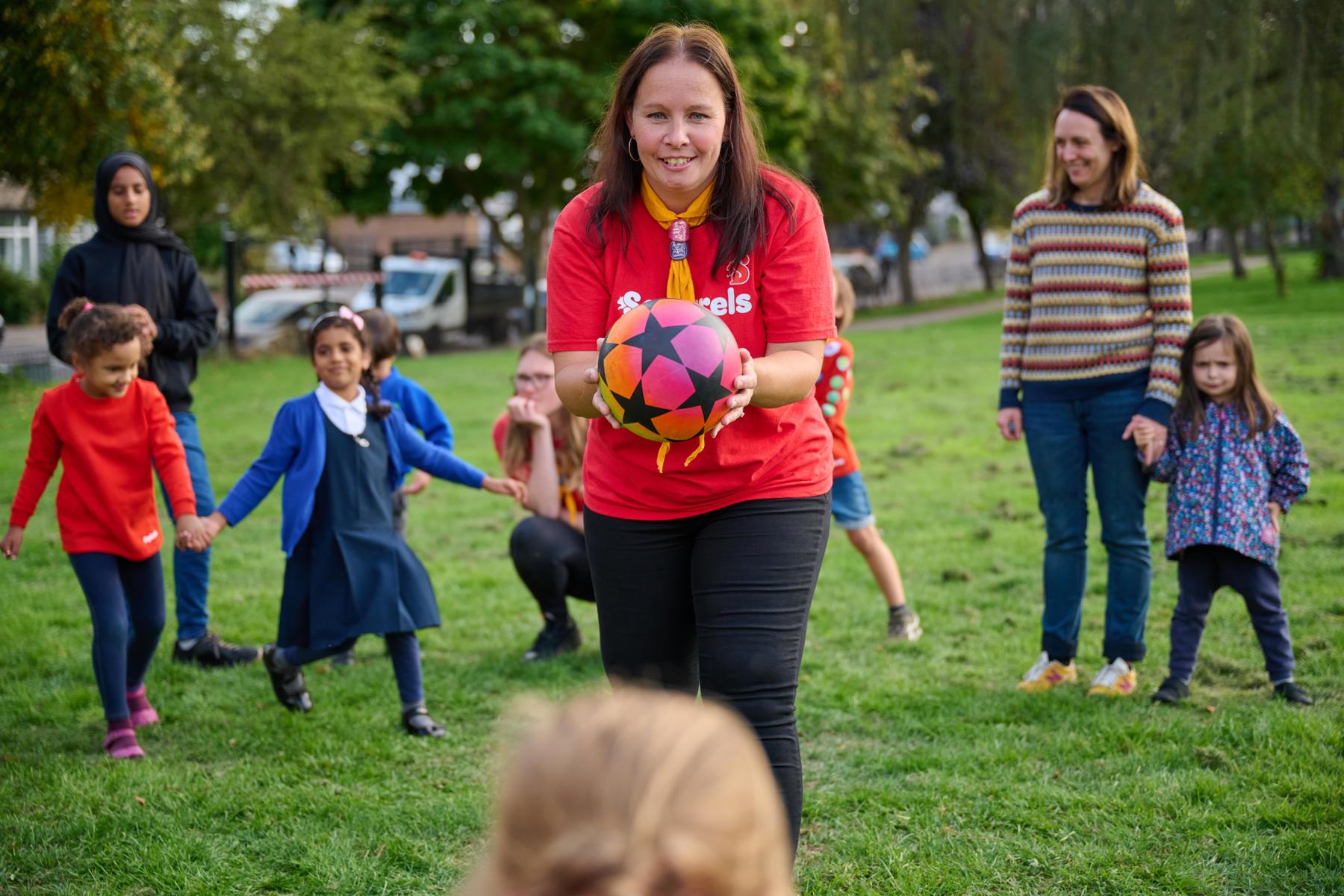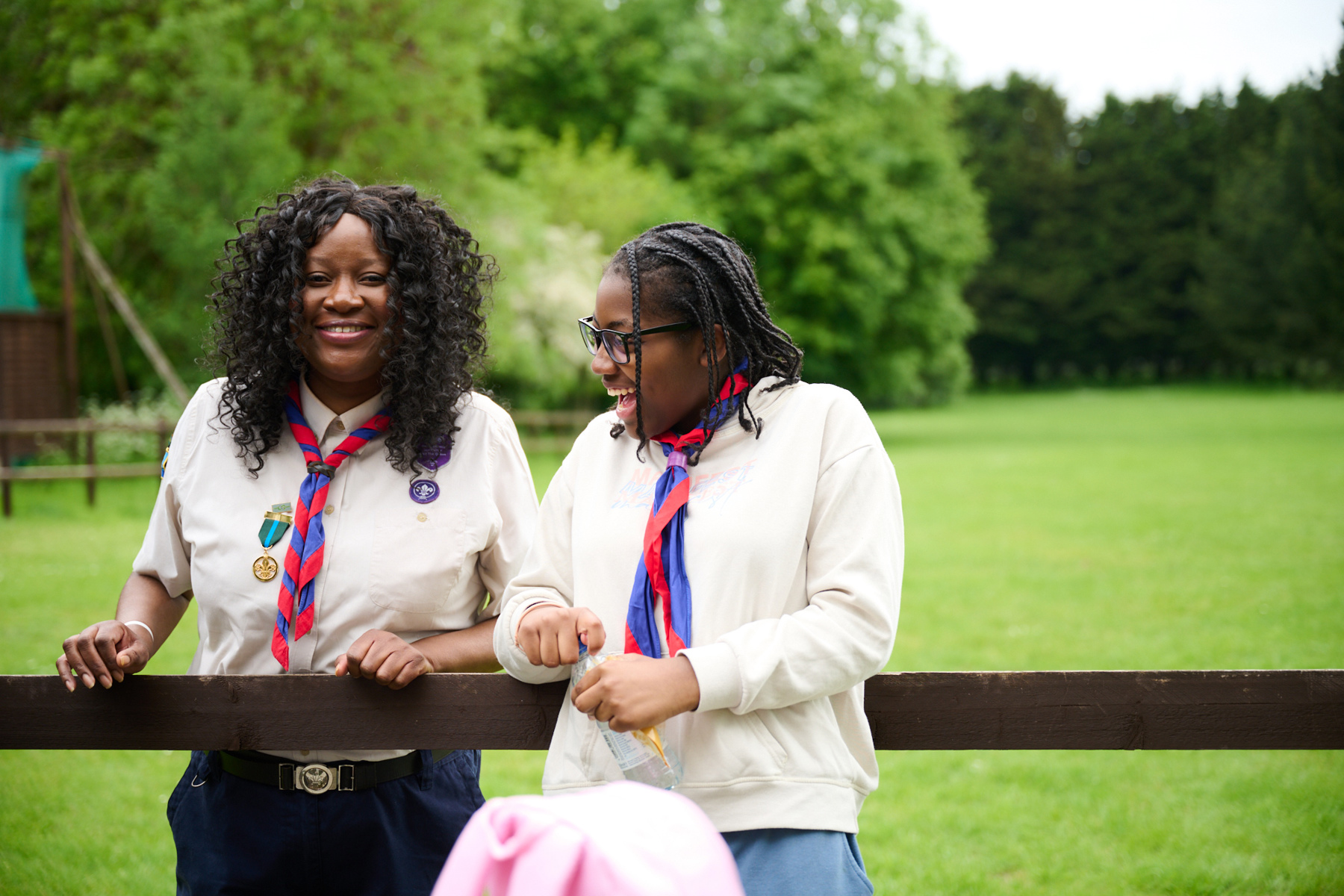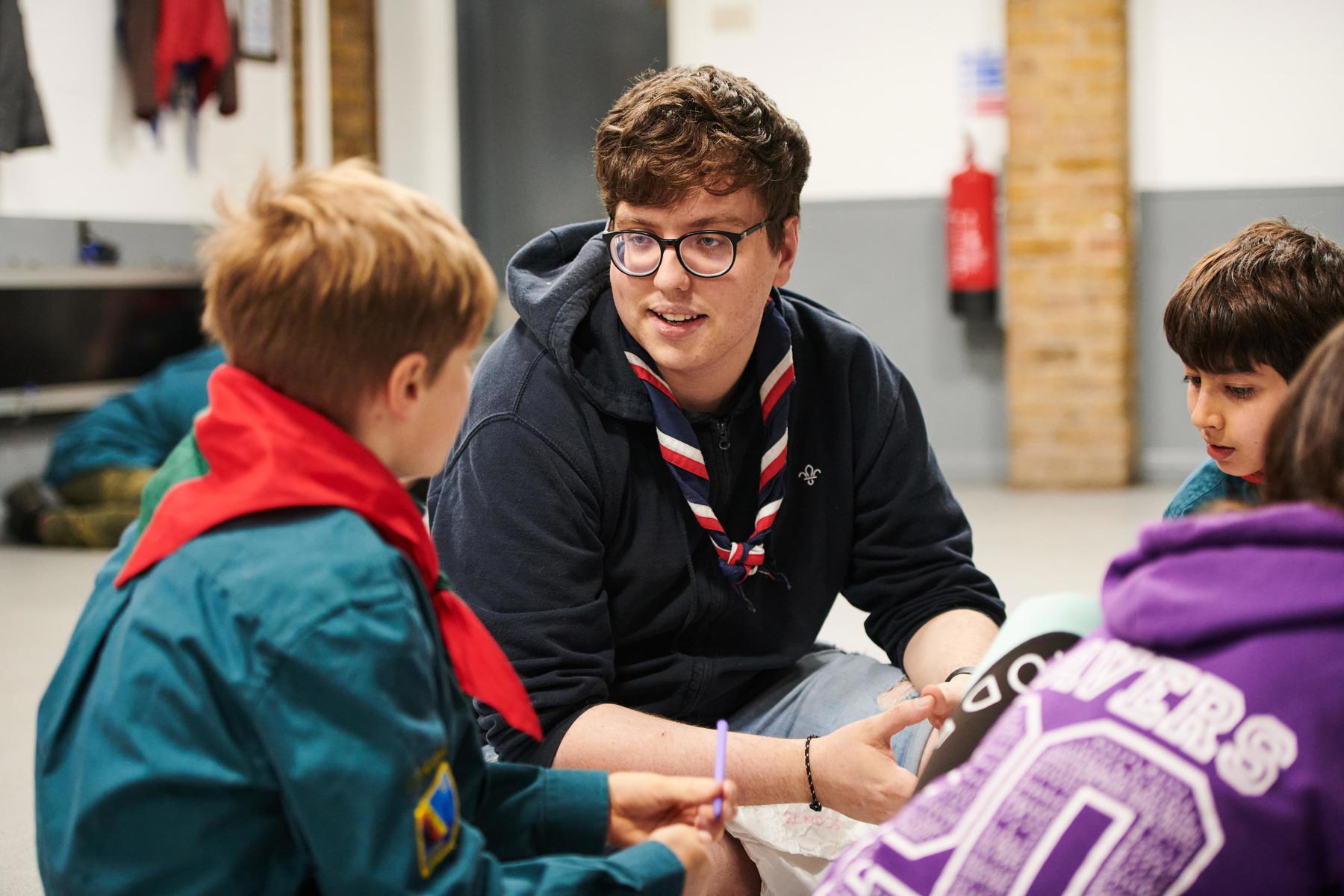Adult rotas
Many hands make light work, so get lots of people involved and trying Scouts with an adult rota.
What’s an adult rota all about?
An adult rota is a great way to engage potential volunteers. They work really well, as they’re a manageable way for people to help and try Scouts.
Adults connected to the group (such as parents and carers, aunts, uncles, older siblings or grandparents) can sign up to help with the occasional session. You may also want more people from your local community who are interested in flexible or occasional volunteering to help form an adult rota too.
For example, a parent or carer for each young person could take it in turns to help one or two weeks per year. Lots of people are happy to help occasionally if they don’t have to make a big commitment.
As an existing volunteer, you get an extra pair of hands to help each week. You’ll also have the chance to show people just how great volunteering is.

How often can someone be on the adult rota and what can they do?
An adult helping occasionally through the adult rota doesn’t need to be recorded on scouts.org.uk as they aren't undertaking regulated activity, and therefore they don't need a criminal record check or internal check..
The maximum they can volunteer is three times in any thirty-day period.
Helpers on the adult rota aren't members of our Sections or wider teams, so they’ll always need to be supervised by Team Members or Team Leaders. They also can’t attend an overnight event.
Someone on the adult rota could:
- run an activity with a group of young people under supervision of a member of the Section Team
- attend a session or event
- walk young people down the road as part of a group
- prepare squash and biscuits to keep young people energised.
Most importantly, they’re a valued extra volunteer to help run Scouts.
What do they need to know?
Adult helpers must always be supervised by a member of the Section Team.
Make sure any helper knows who their main point of contact is, as well as what the activity is they’ll be helping with to make sure they’re comfortable and happy with it. You may want to take an emergency contact number for them and ask about any reasonable adjustments they may need, such as allergies or dietary requirements.
Anyone helping out at Scouts must read, understand and commit to following the Yellow Card. This is our code of practice for all adults in Scouts, where we commit to making the safety of young people our priority.
Make sure anyone on the adult rota is give basic health and safety information, such as the fire procedure for your venue, and make sure they know what they can do to help (and what they can’t).

Before you start an adult rota
Here are some things to think about before you start an adult rota:
Ask yourself what needs to be done regularly at each meeting. This’ll help you to have a list of tasks for anyone on the adult rota to do each week. However, it may change depending on the activity.
Make sure there’s fun and enjoyable tasks for people too, such as handing out badges.
You could also see if there are any occasional tasks, such as monthly or yearly, that people could help with too. For example, they could help apply for a grant or book a campsite.
You could send an email, post on social media, ask face to face in a meeting, use WhatsApp or a text, use a Google Form, or send a letter.
You could send the programme out, then ask people to assign themselves to a week. Sharing the programme is a great way to show all the varied activities you do and get people excited. People could then pick to help with activities they may like or have experience of. They’ll be a lot happier to help if they’re confident in or have some knowledge of the activity.
You could use a message template to send to each person as a reminder. Telling people in advance what they’ll be doing helps to make sure they’re happy and comfortable too.
Your message template could also include:
- the date, time and location
- a quick brief for the week’s activity
- sending them a copy of the Yellow Card
- any health and safety information, such as what to do if the fire alarm goes off
- making sure they know what they can do to help, as well as what they can’t
- giving them a key contact’s name and telephone number
- asking them if they’ve any reasonable adjustments, such as allergies or dietary requirements
- asking for their contact details and an emergency contact, depending on what you’ll be doing
You may also want to write a follow-up thank you text or email template too to send anyone who joined too.
Reassure people it’s OK to not know anything about the activity too. They don’t need to be able to put up a tent or light a fire to join Scouts.
It’s a chance for everyone to learn something new together. You could also share your own experiences, what you’ve done and what you’ve learned.
Think about the programme carefully to make sure new adults can get involved and interacting with everyone. Small group activities can work well, as they make it easier for all the adults to play their part.
Depending on how confident people are, you could write out or print out some quick game ideas for them to help run.
However, some people may just want to help tidy up or make the snacks - and that’s OK.
Remember that most adults on the adult rota won’t have a Scouts criminal record check.
It’s important to always have enough volunteers on hand to support and supervise the new adult. You could invite existing volunteers from your group or the wider District.
Anyone helping out at Scouts must read, understand and commit to following the Yellow Card. This is our code of practice for all adults in Scouts, where we commit to making the safety of young people our priority.
Decide how you’ll make new adults feel welcome.
People on an adult rota don't usually wear a uniform, but it may be nice to give them a group necker and a Scouts name (if you use them in your section).
You should always introduce them at the start of the session and you could ask young people to say hello to them during the session. Asking everyone to say thank you to them at the end is often appreciated!

Running an adult rota
When a young person joins, you may want to ask the people they live with whether they’d be happy to help out occasionally, such as once or twice a year.
You could hold an introductory parent and carer meeting each year and ask if anyone has any skills they could share.
You could also share your programme and see if anyone could help at any of your planned sessions.
However, remember it’s optional. Some people may not be able to help out due to work or childcare. They may be able to help out in other ways though!
When a new adult volunteer joins, see if hey could ask the people they live with, their friends or possible work colleagues whether they’d be happy to help out from time to time. They might have a skill or talent they could share.
Why not have some leaflets or posters ready that they can take to give to friends or put up in their work space?
You could say that it'll help them give back, be involved in their local community, develop their skills, get them involved in adventures, have fun and make new friends.
Remember, the rota doesn’t just have to be for parents and carers of your young people.
It could be for wider family and friends, or it could be for people in your local community interested in volunteering.
If you or your volunteers know anyone who could get involved, or want a way to introduce new volunteers gradually, they can sign up too!
Why not try a shout-out for skills or people to join the adult rota in your local community Facebook groups? You could also hand out leaflets, advertise in a local paper, or put some posters up.
Talk to the adults about what they enjoy doing. Do they have specific skills your team would benefit from?
Once you know what people are interested in, you can match them up with activities that suit them.
This’ll help them to enjoy it more if they’re doing something they feel confident in and like doing!
You might want to run a skills survey. A skills survey is a letter, email or message to parents and carers.
It asks them what they could help with and any skills, talents or hobbies they could share.
You could also ask this at a parent and carer meeting in-person too.
It's OK if someone can’t help at weekly sessions or even once a term.
There are plenty of other ways for them to get involved behind the scenes – could they manage the rota, help with accounts, run a one off skills session, apply for gift aid, fundraise, do admin or help with social media?
Always remember to check what learning or guidance they need to take part in each role.
It’s important to have good communication with people.
You could send a message once they’ve signed up, then send them a reminder a week before to check in.
Remember to share your plan with your new volunteer. This helps to make sure they’re happy and comfortable with the activity.
Before the session, make sure they’ve read and understood the Yellow Card. You should give them basic health and safety information, such as what to do if the fire alarm goes off. You may want to ask them for an emergency contact.
Remember to make sure they know what they can do to help (and what they can’t) too.
At the session, always make sure any helper is introduced, warmly welcomed and knows who their main point of contact is.
Throughout the session check how they’re getting on and check in with them at the end. You could send them a thank you message too.
Remember to check if they’ve any allergies, dietary requirements, additional needs or reasonable adjustments for them to comfortably take part.
Look out for anyone who’s particularly enjoying their time on the rota. They might make a great person to volunteer a little more regularly. Could you invite them to take the four-week challenge?
Remember that a big, genuine thank you goes a long way.
Remind young people to say thank you, give them a shoutout on your social media, write them a card, or get young people to draw pictures.
You could also get them a small gift from Scout Store, such as a badge or certificate, to say thank you.

Adult rota FAQs
Even if you've enough Scout volunteers, an adult rota is a great way of helping young people’s loved ones feel part of the group. It’s nice for them to see what a great time their young people are having.
An adult rota may be really helpful for when you want to plan day trips or Scout sessions away from your normal meeting place, including outside.
You could also use an adult rota to plan some more complex activities each term that might need some extra supervision.
Just don’t leave them unsupervised or allow them to stay overnight at a residential event without a criminal record check.
From running an adult rota, you’ll have a good idea of who you could ask to get more involved when you need volunteers in the future. They may want to take the four-week challenge.
An adult helping occasionally through the adult rota doesn’t need to be recorded on scouts.org.uk and therefore they don't need a criminal record check or internal check.
The maximum they can volunteer is three times in any thirty-day period. Just don’t leave them unsupervised or allow them to stay overnight at a residential event without a criminal record check.
Make sure all helpers have been:
- told in advance what the activity is
- able to read and understood the Yellow Card
- given basic health and safety information, such as fire drills
- told who their main point of contact is
- told what they can do to help (and what they can’t)
Take a look at 16.7.2.2 of POR for the up-to-date definition of Helpers, including what type and frequency of helping out would mean a volunteer will need a criminal record check.
Adult rotas work brilliantly for all sections, including Cubs, Scouts and Explorers.
You could encourage young people to come up with new ways for their loved ones to get involved, such as by sharing skills.
They could take the lead and ask the people they live with to help share their talents with the group.
A mum could help referee a Cubs football match. An aunt could run a Zumba session for a Scouts group, or a grand-dad may be able to help run a DIY session for Explorers.
There are lots of ways to share skills for life for all ages!
Adult rota resources
Download a template from the Scouts Brand Centre to start your adult rota.
Visit the brand centreMore tools to help you
We’ve got plenty of ideas to help you attract and welcome volunteers to Scouts
Try them out nowLearn more about team members and helpers
With our new volunteer experience, we’ll continue to have helpers who provide informal support to help deliver Scouts, in line with our current POR.
Find out more about the difference between team members and helpers.
Team Members and helpers